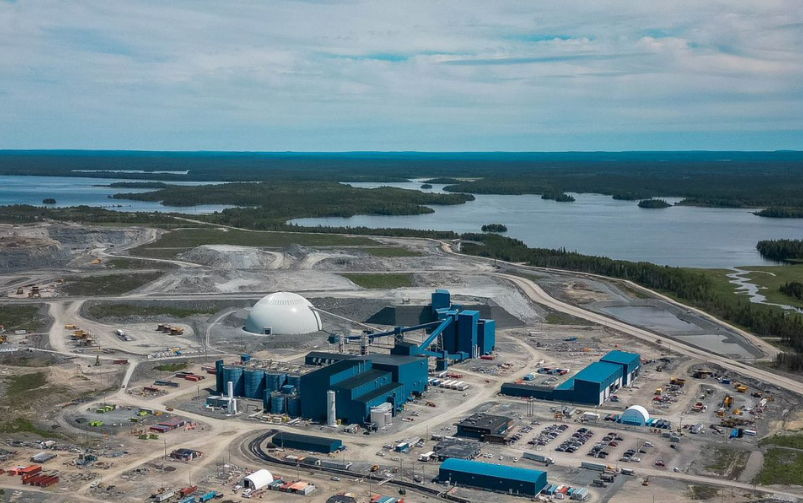Sayona Mining’s North American Lithium project in Quebec made its first shipment of spodumene concentrate in August 2023. Courtesy of Piedmont Lithium.
Welcome back to your weekly mining news recap, where we catch you up on some of the news you may have missed. This week’s headlines include long-term uranium contract prices climbing to a 16-year high, FPX Nickel reducing carbon intensity in the mine plan for its Baptiste project and BHP and Lundin Mining partnering up to acquire Filo Corp and its copper-gold-silver asset.
Canadian graphite miner Falcon Energy Materials PLC, which was previously known as SRG Mining Inc., has relocated its headquarters to Abu Dhabi, United Arab Emirates (UAE), as reported by The Financial Post. The move follows the federal government’s introduction of measures in July that aim to limit foreign investments into large Canadian mining companies that produce critical minerals. The company moved to the UAE last month but will remain listed on the TSX Venture Exchange.
Iamgold reported that it had operated at an average of 60 per cent of its nameplate capacity for 30 days to achieve commercial production at its Côté Gold operation in Ontario. Nameplate throughput for the Côté plant is 36,000 tonnes per day. The company’s goal is to have the operation ramped up to 90 per cent by the end of the year.
Following Sayona Mining’s operational review earlier this year of its North American Lithium operation in Abitibi, Quebec, which led to cost-cutting measures and layoffs, the mine still has a bit of a hill to climb, as reported by Mining.com. While more spodumene concentrate was produced in the second quarter than the previous one thanks to improved mill utilization and recoveries, the company shipped less of the product in the second quarter due to weather delays. While operating unit costs for one tonne of spodumene concentrate are $995, the average realized selling price is currently $604.
Generation Mining has secured approval from the federal government to construct specific water management structures at its Marathon palladium-copper project in northwestern Ontario. A few other provincial and federal approvals and permits are expected to be secured in the near future, which are needed for Generation to proceed with construction.
FPX Nickel’s adoption of trolley-assist haul truck systems in the mine plan for its Baptiste nickel project in central B.C. will cut its projected diesel usage by roughly 50 per cent. The update to the mine plan from FPX’s 2023 preliminary feasibility study is meant to help position the future mine as one of the world’s least carbon intensive nickel operations.
Production at New Gold’s Rainy River mine in northwestern Ontario resumed on July 27; the company had paused operations on July 24 when Jeffrey Woolsey, an employee, was killed by falling material while operating equipment in the open-pit mine, as reported by Northern Ontario Business. Investigations are ongoing.
Long-term uranium contract prices have reached a 16-year high, which is being attributed to uncertainty around supply and increased demand for the nuclear fuel, as reported by Reuters. Term prices are about US$79 per pound, which is the highest level since 2008, and are expected to increase in the next few months.
ICMM shared that 36 people employed by member companies lost their lives on the job in 2023, which is an increase compared to 2022 but a decrease from 2021, as reported by Engineering News. Ten of these fatalities from 2023 were linked to mobile equipment and transportation, while five were due to structural failures. One of the reported fatalities for the year took place in Canada.
BHP and Lundin Mining are teaming up to jointly acquire Filo Mining Corp. and its Filo del Sol copper-gold-silver project along the border of Argentina and Chile for US$3 billion, as reported by BNN Bloomberg. The companies are also planning to form a 50/50 joint venture that would grant BHP ownership of half of Lundin’s Josemaria project, which is located in close proximity to Filo del Sol. The companies intend to merge the two projects, which will cut costs.
Doris Hiam-Galvez's new book Designing Sustainable Prosperity: Natural Resource Management for Resilient Regions, released on Wednesday, delves into Designing Sustainable Prosperity (DSP), a method she developed that can help mitigate mining-related environmental harm while also tackling economic setbacks that arise from mine closures in remote areas of the world. The book offers six comprehensive steps to follow to use DSP as a way of reaching long-term prosperity in regions that are dependent on short-term extraction.
That’s all for this week. If you’ve got feedback, you can always reach us at editor@cim.org. If you’ve got something to add, why not join the conversation on our Facebook, Twitter, LinkedIn or Instagram pages?




